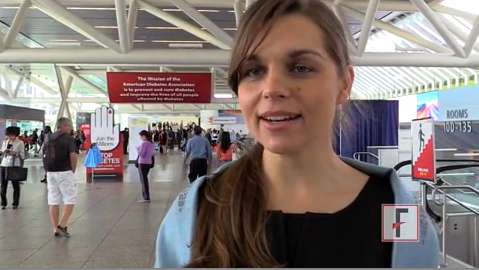User login
SAN FRANCISCO — When it comes to glucose ingestion, the adolescent brain reacts differently than the adult brain. That’s according to functional MRI scans comparing the cerebral blood flow of lean adolescents with lean adults, Dr. Ania M. Jastreboff reported June 15 at the annual scientific sessions of the American Diabetes Association.
Researchers found that lean adolescents showed increased cerebral blood flow in several regions, including the reward-motivation region (striatum), the impulse control region (anterior cingulate cortex), and the prefrontal cortex, which is in charge of executive function regulation. All these regions undergo marked developmental changes during adolescence.
In a video interview, Dr. Jastreboff, assistant professor of internal medicine and pediatrics at Yale University, New Haven, Conn., further explains the study’s findings and its implications.
On Twitter @naseemmiller
SAN FRANCISCO — When it comes to glucose ingestion, the adolescent brain reacts differently than the adult brain. That’s according to functional MRI scans comparing the cerebral blood flow of lean adolescents with lean adults, Dr. Ania M. Jastreboff reported June 15 at the annual scientific sessions of the American Diabetes Association.
Researchers found that lean adolescents showed increased cerebral blood flow in several regions, including the reward-motivation region (striatum), the impulse control region (anterior cingulate cortex), and the prefrontal cortex, which is in charge of executive function regulation. All these regions undergo marked developmental changes during adolescence.
In a video interview, Dr. Jastreboff, assistant professor of internal medicine and pediatrics at Yale University, New Haven, Conn., further explains the study’s findings and its implications.
On Twitter @naseemmiller
SAN FRANCISCO — When it comes to glucose ingestion, the adolescent brain reacts differently than the adult brain. That’s according to functional MRI scans comparing the cerebral blood flow of lean adolescents with lean adults, Dr. Ania M. Jastreboff reported June 15 at the annual scientific sessions of the American Diabetes Association.
Researchers found that lean adolescents showed increased cerebral blood flow in several regions, including the reward-motivation region (striatum), the impulse control region (anterior cingulate cortex), and the prefrontal cortex, which is in charge of executive function regulation. All these regions undergo marked developmental changes during adolescence.
In a video interview, Dr. Jastreboff, assistant professor of internal medicine and pediatrics at Yale University, New Haven, Conn., further explains the study’s findings and its implications.
On Twitter @naseemmiller
AT THE ADA ANNUAL SCIENTIFIC SESSIONS
